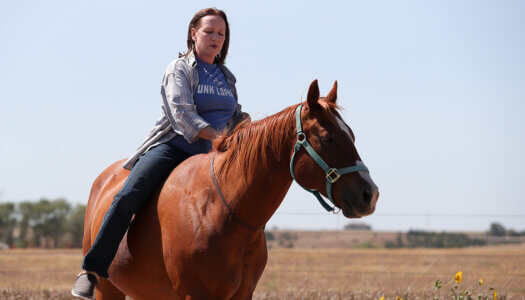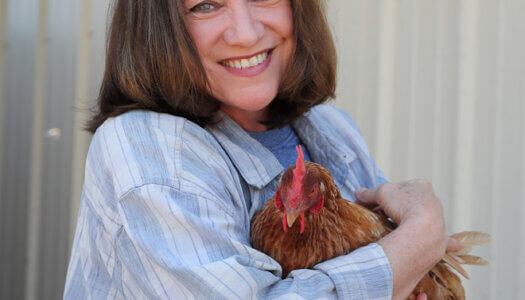
By TYLER ELLYSON
UNK Communications
KEARNEY – There’s one moment that has influenced Kristen Majocha’s entire career as an educator and administrator.
She was 36 years old at the time, a mother of three, sitting in a doctoral program class at Duquesne University, a private Catholic school in Pittsburgh.
Majocha looked around the room and saw other students wearing expensive clothes and carrying designer bags. She had her “brown mom shoes” on.
“I was embarrassed,” Majocha said. “I thought, ‘I don’t belong here. I don’t fit in.’”
Duquesne isn’t a cheap school, and her family didn’t have enough money to contribute as donors. So how did she end up with a full-tuition scholarship?
That’s the question she asked her adviser, who smiled, then explained how Majocha fit the university’s mission. Each year, the program leaders award a scholarship to a qualified student who wouldn’t be able to attend Duquesne without that financial support. They chose the 36-year-old mother of three.
“I never forgot that,” Majocha said. “And I carry that on my heart everywhere I go. I feel obligated to give back in that way.”
As the new senior vice chancellor for academic affairs at the University of Nebraska at Kearney, Majocha is committed to removing the educational barriers students may face and helping Lopers overcome any obstacle that stands between them and success.
LEARNING TO LEARN
Majocha grew up in an economically disadvantaged area in western Pennsylvania.
For a long time, college wasn’t part of her plan.
“I didn’t want to go,” she said. “I was not prepared. It was not on my radar screen.”
However, her mother and father, a U.S. Navy and Vietnam War veteran, viewed higher education as the path to a promising future.
“That was important to them,” Majocha said. “They wanted me to have a better life and better working conditions than they did. In their minds, a college degree would do that for me and my siblings. And it was true.”
After high school, Majocha enrolled at nearby Slippery Rock University as a first-generation college student and federal Pell Grant recipient. Her mother attended classes at the same time at Point Park University in downtown Pittsburgh and went on to earn a Master of Business Administration from the University of Pittsburgh.
A provisional admission student, Majocha struggled with writing and math, and she had very little science background.
“Every class I took, I had to start from scratch,” she said. “I had nothing to draw on. It was all new to me.
“I had to fight twice as hard to get half as far.”
Less than three years into her undergraduate education, Majocha left school to join the Navy. She served as an airman in air traffic control, stationed in Tennessee, for just under a year and was discharged early to deal with her father’s untimely death.
Determined to complete her degree, Majocha took one class at a time over the next 11 years while working and starting a family. She graduated in 2002 with a bachelor’s degree in communication.
“Once I figured out how to learn, how to study, how to take notes and how to get help, I realized that I love to learn and I’m really good at it,” Majocha said.
And she wanted to pass that passion on to others, particularly students who come from similar situations.
Majocha earned a master’s degree in rhetoric and the philosophy of communication from Duquesne before completing her doctorate in rhetoric in 2009.
She worked at the University of Pittsburgh at Johnstown from 2006-18, serving as an associate professor, department chair, director of international program support and services and assistant vice president of academic affairs. Among her accomplishments, she led a team that increased international student retention by 50% and overall student retention by 6%, oversaw a revision of the general education program and worked with executive leadership to improve graduation rates by 5%.
From 2018-22, Majocha was a dean at California University of Pennsylvania, where she led a reorganization of the campus undergraduate colleges, going from three colleges to two with shared governance. This change resulted in more than $1 million in annual savings.
Majocha also played a key role in developing Pennsylvania Western University.

LOPER LOVE
Although her career started out east, Majocha envisioned herself in the Midwest for many years.
She fell in love with the region during a research trip to Idaho, Montana and Wyoming and interviewed for a job in Colorado about five years ago.
Her introduction to UNK came during the 2016 NCAA Division II Wrestling Championships in Sioux Falls, South Dakota. Majocha was on the floor, photographing the Pitt-Johnstown team, when a Loper wrestler was announced on another mat. She describes the ensuing scene as a “sea of blue shirts” – parents, students, community members and other fans all standing at once and chanting U-N-K, U-N-K.
“Wow, that’s how you support a team,” she thought to herself.
“I was just overwhelmed,” Majocha said. “This is a school that is student-centered, that loves its students.”
Majocha was offered a position in Wyoming earlier this year but she turned it down because it wasn’t the right fit. The following Monday, after driving all the way back to Pennsylvania, she received an email about the UNK opening and immediately remembered that moment from 2016.
“This is the job I really wanted,” she said. “I love UNK. Every step of the way it felt right. In my gut, in my heart and in my soul it felt right. And here I am.”
Majocha accepted the senior vice chancellor for academic affairs position in April and moved to Kearney this summer with her husband Darrin and four children – Gunner, 24; Mitchell, 22; Sydney, 20; and Alyssa, 15. She also brought 10 chickens, three cats, two dogs and two ducks.
“There aren’t any kennels that take chickens, by the way. I tried,” she said with a smile.
She officially started at UNK on July 1, replacing Charlie Bicak, who retired after 13 years in the role.

CAMPUS COMMITMENT
The first two months on the job included “a lot of learning” for Majocha, who’s met with fellow administrators, faculty, staff and community members to discuss the challenges and opportunities for both UNK and Kearney.
She’s excited about the “outstanding” academic programs and faculty on campus, as well as the university system’s commitment to serving students and addressing statewide issues such as workforce development.
“That commitment to the betterment of Nebraska is contagious,” she said. “Who doesn’t want to be part of a winning team?”
As UNK’s chief academic officer, she’s focused on next year’s reaccreditation visit from the Higher Learning Commission and developing strategic initiatives that support the university’s mission while respecting state resources.
“In a difficult enrollment environment, you just find ways to get things done,” she said. “If one solution doesn’t work, then we find another that does. When it’s mission-driven, when it serves students and when it strengthens the long-term stability of our institution, I have no problem making those difficult decisions.”
Working alongside the deans, Majocha plans to evaluate academic programs to ensure they meet the current and future needs of students and the state. This includes identifying emerging programs “where the jobs don’t even exist yet.”
“Are we thinking five, 10, 20 years out? Do we have a vision when it comes to programming?” she explained.
Majocha is a champion of the teacher-scholar model, where faculty research enhances classroom instruction, students participate in research and other experiential learning opportunities with their teachers, and the results inform best practices in the job market.
Like her predecessor, she’s also very engaged on campus. You’ll see her at athletic events, fine arts performances, lectures, research presentations and other UNK and community gatherings.
Majocha calls herself an “all-in kind of gal,” someone who’s willing to give everything to accomplish their goals.
“This work is rewarding to me,” she said. “I love what I do and I want to be here.”
PHOTOS BY ERIKA PRITCHARD, UNK COMMUNICATIONS




